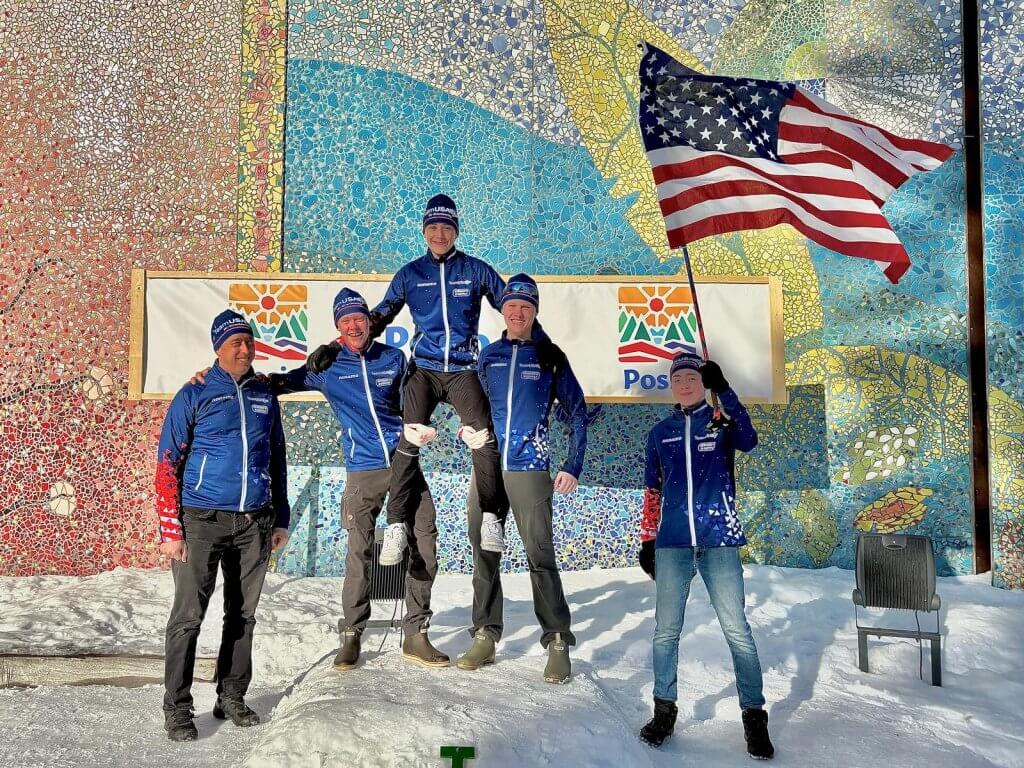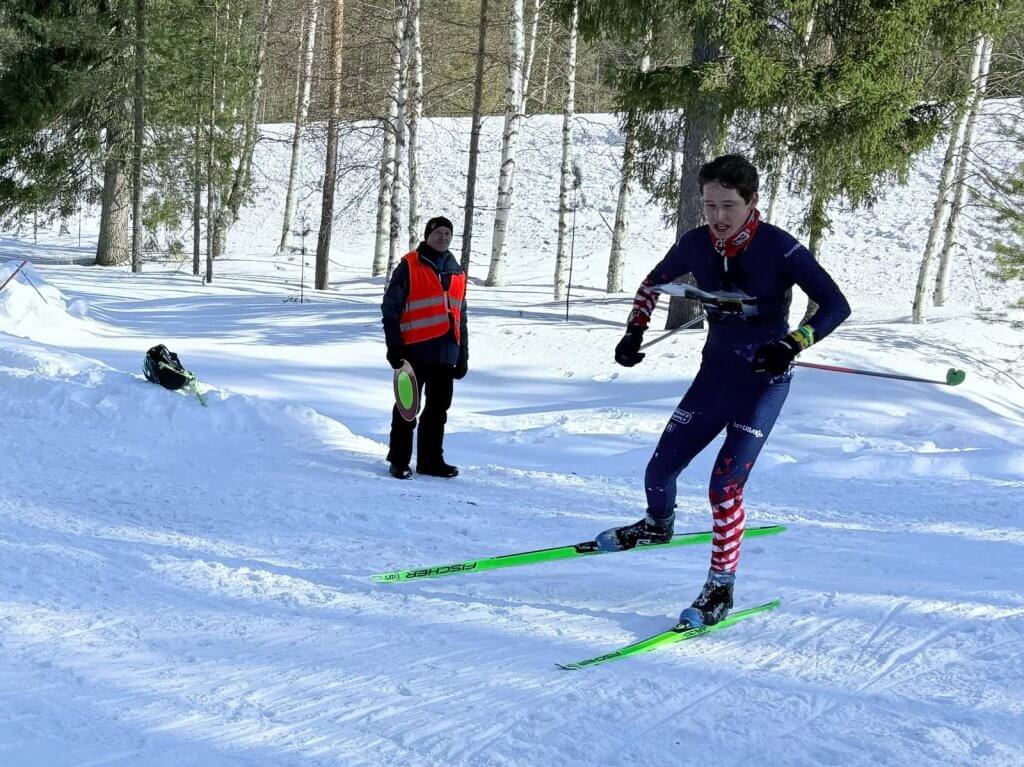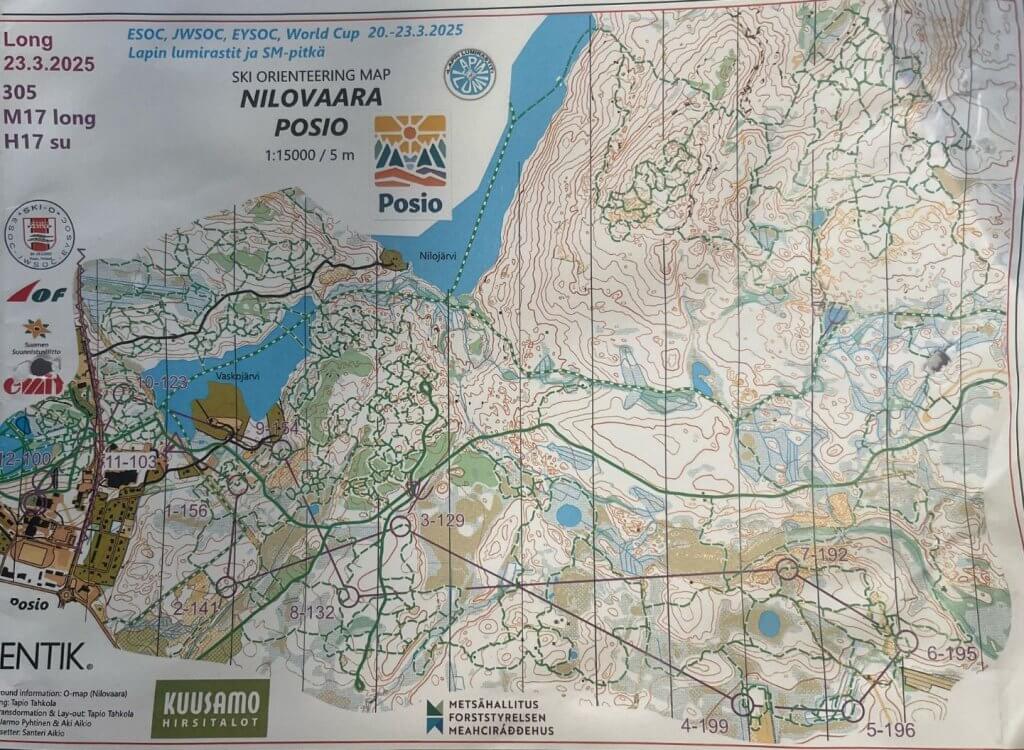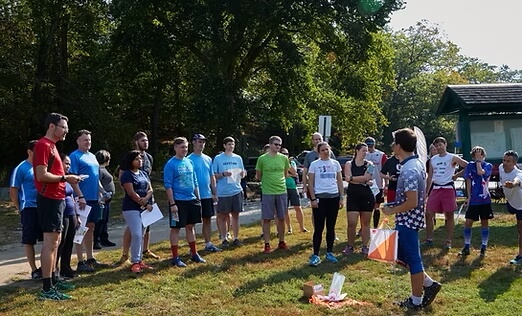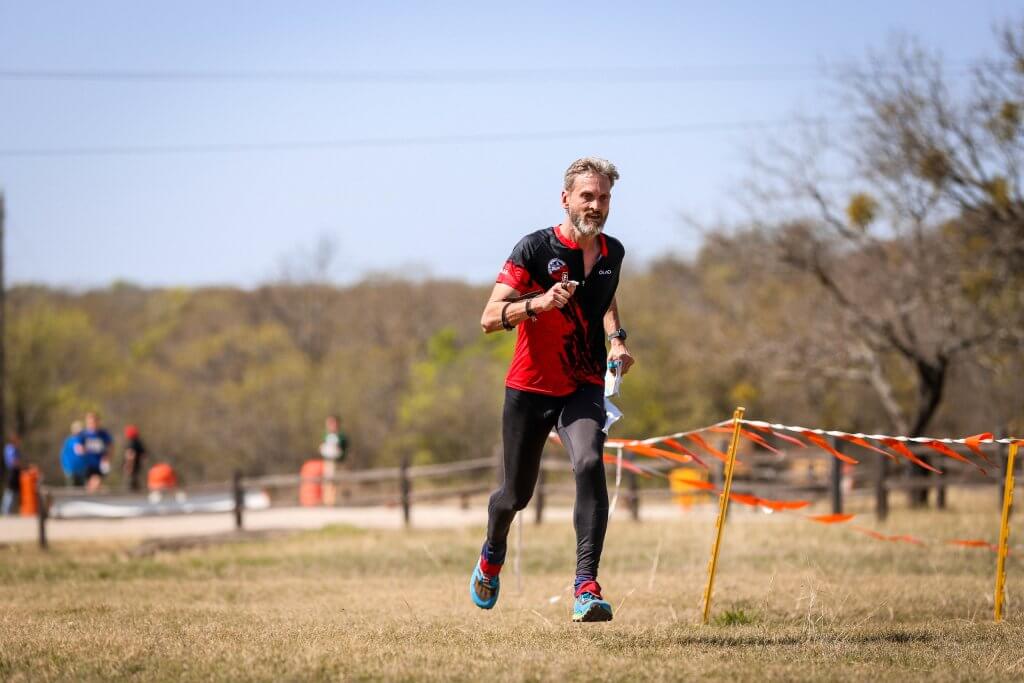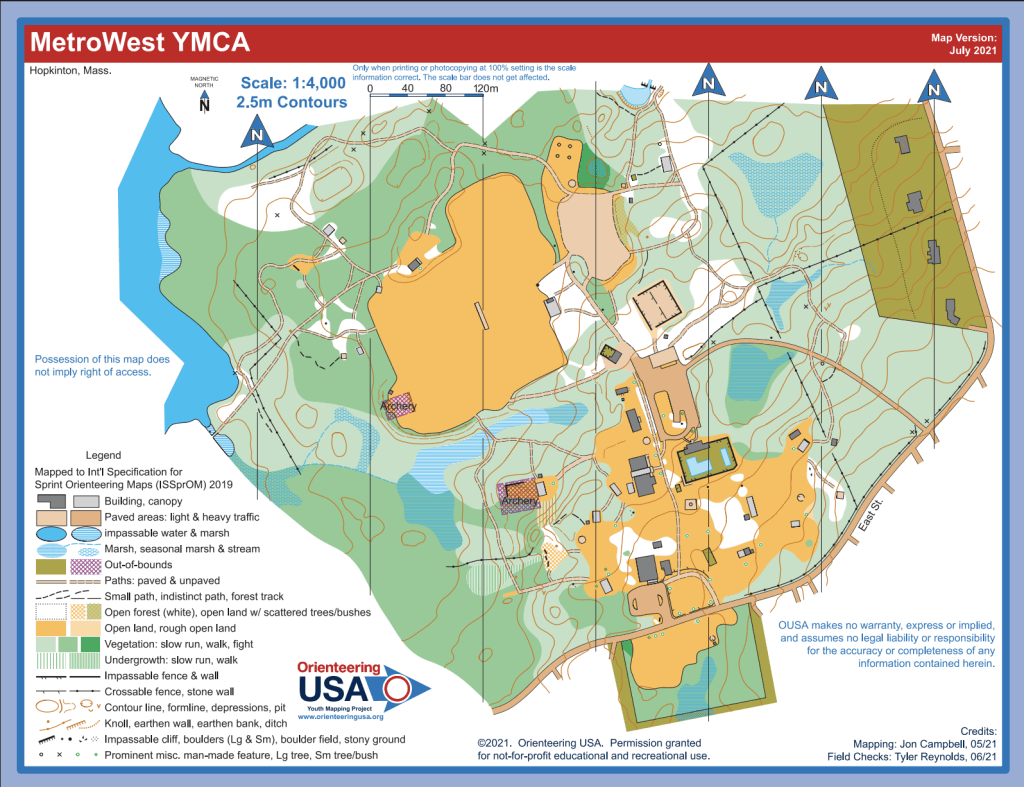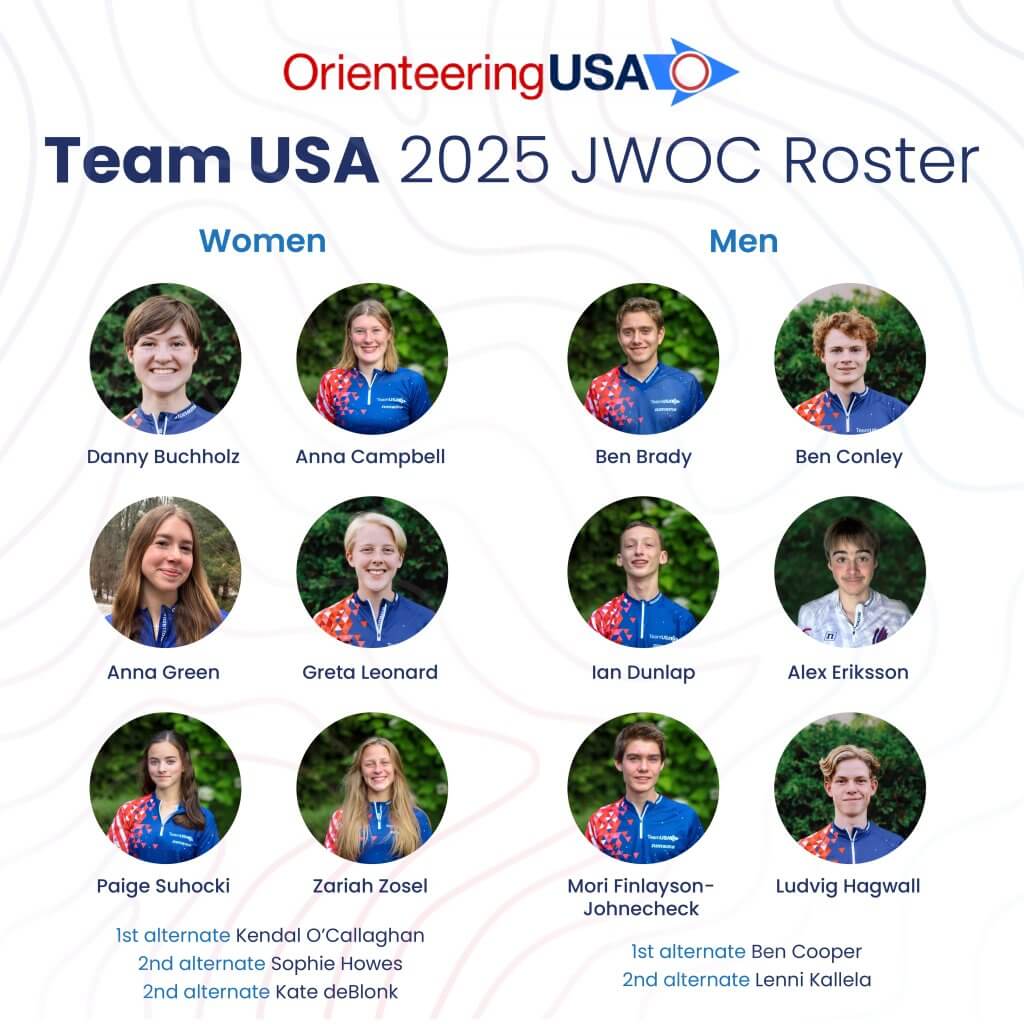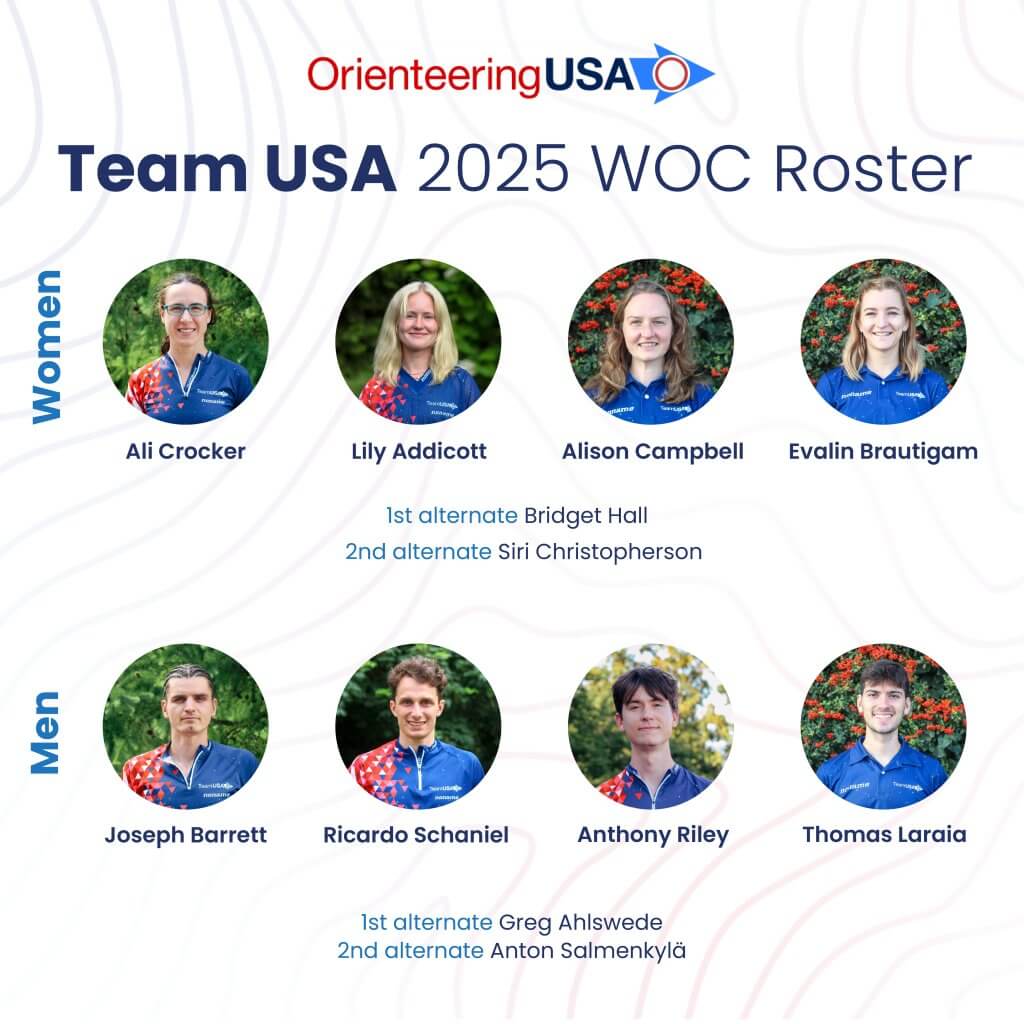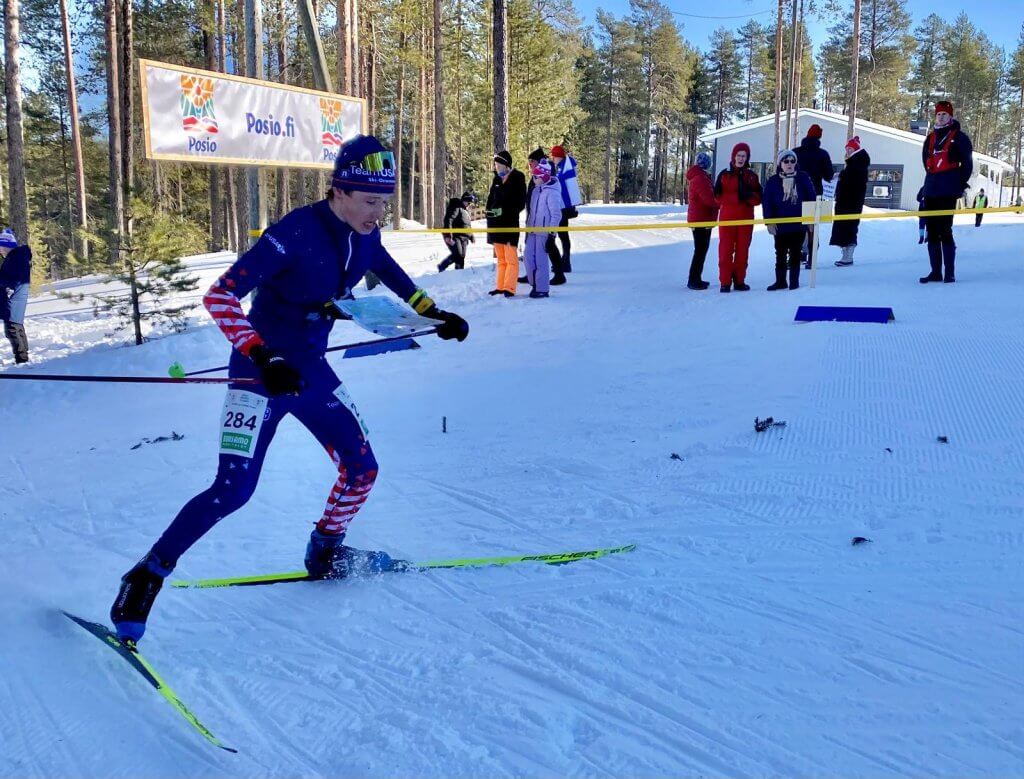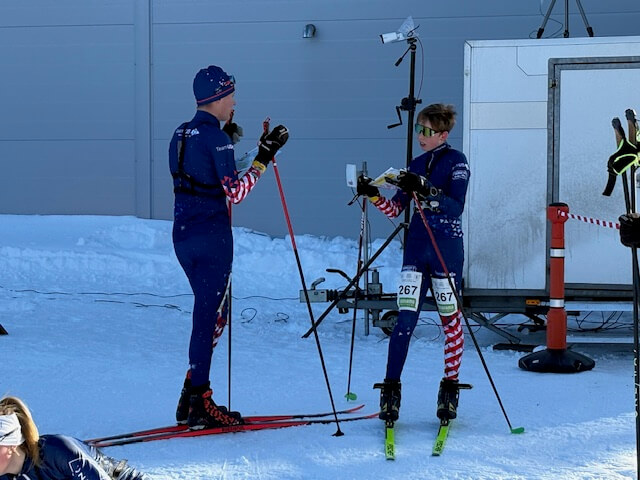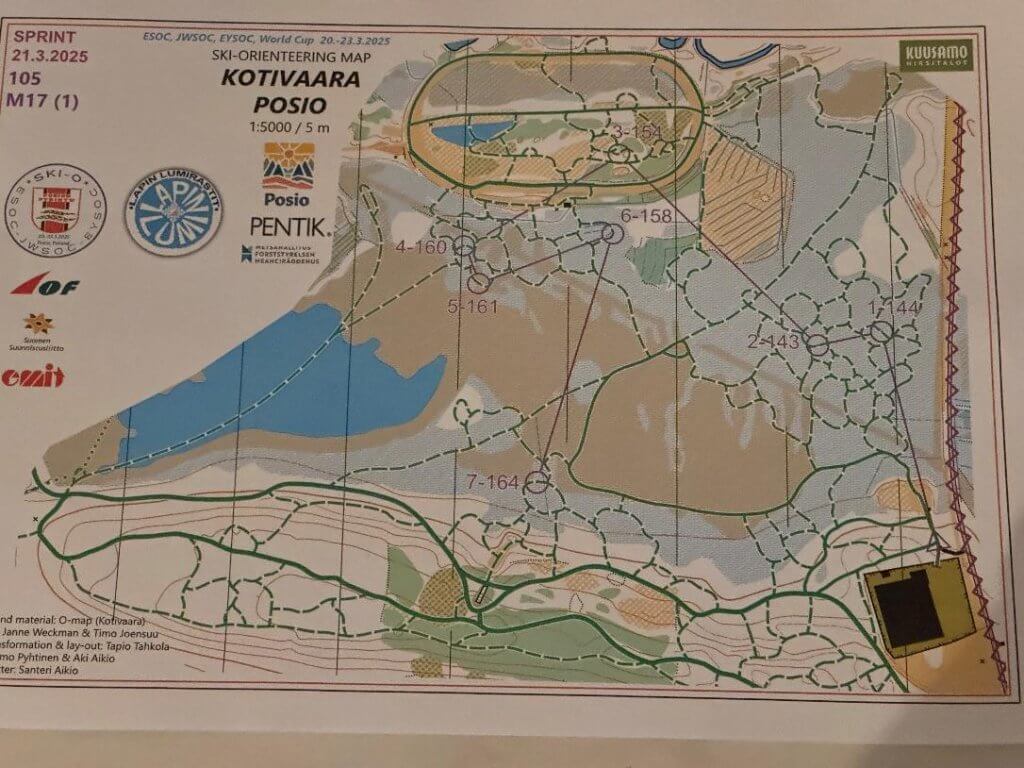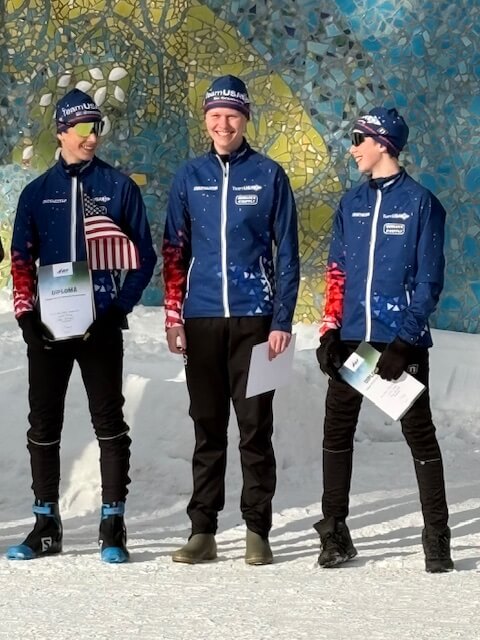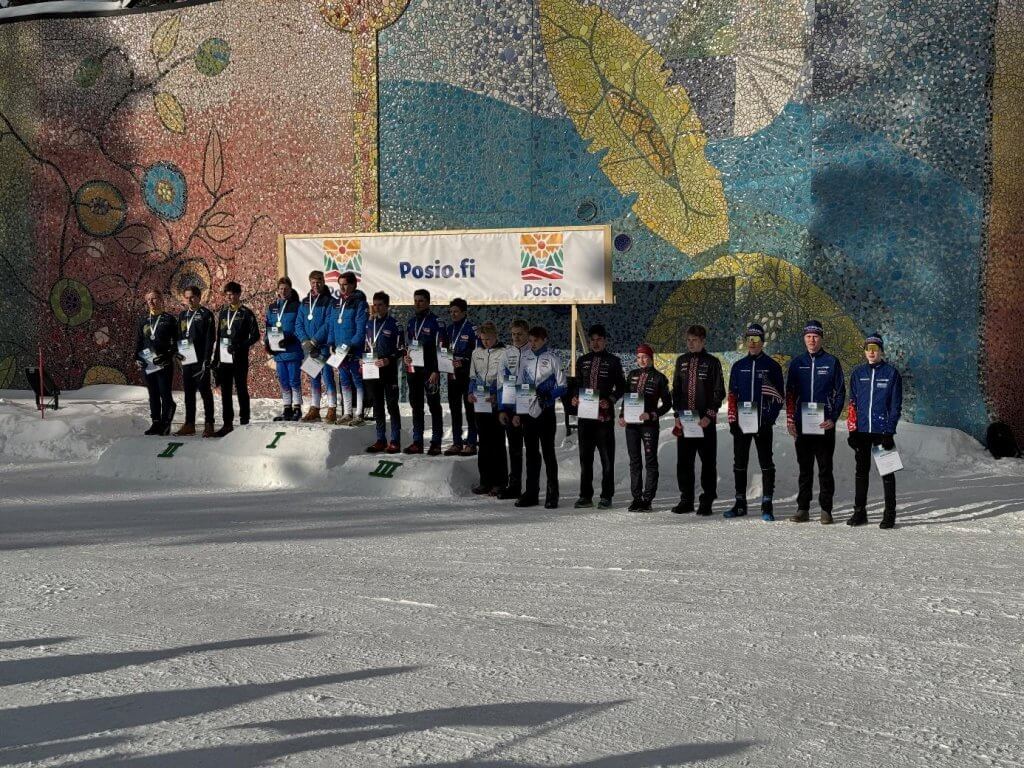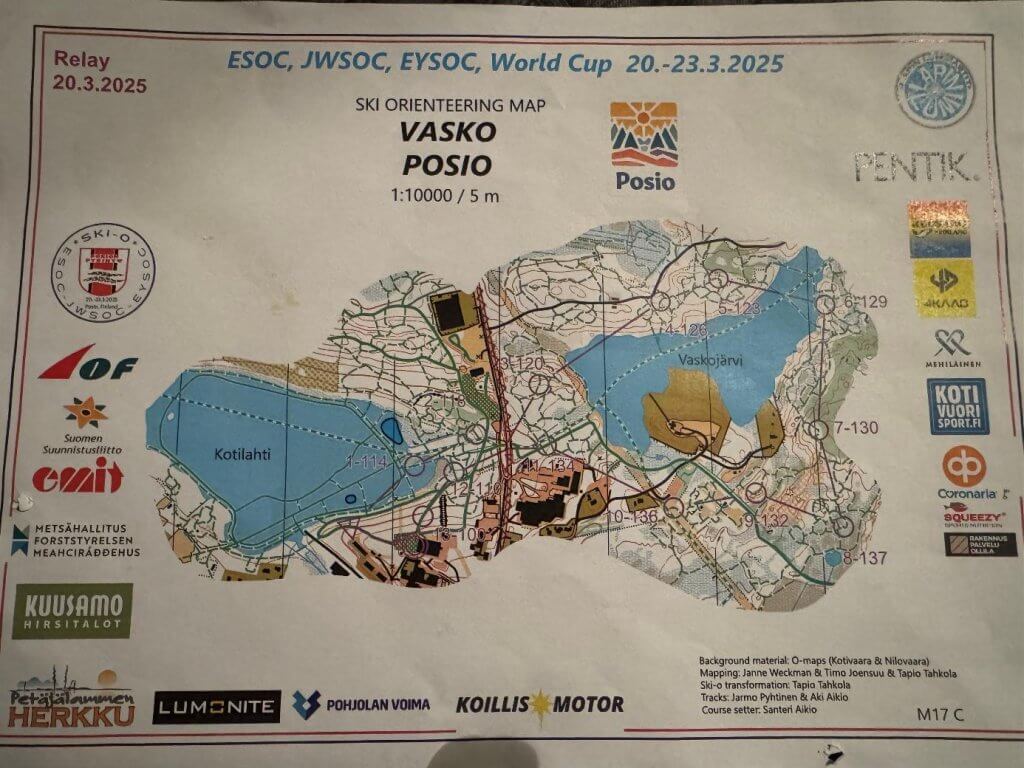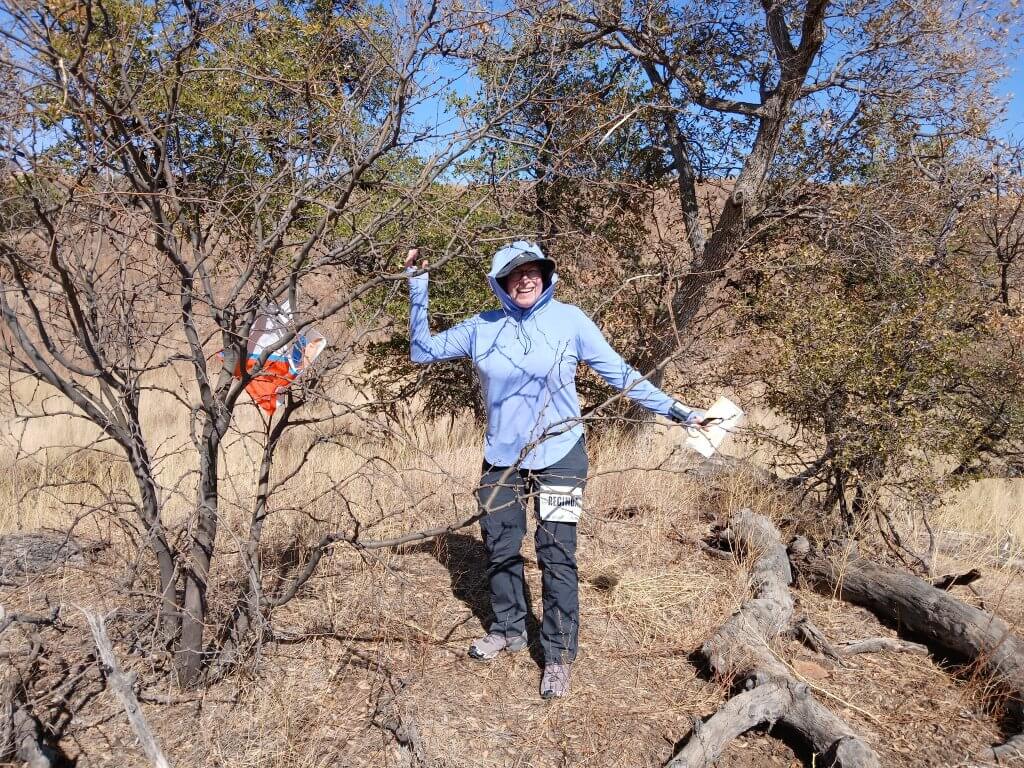March OUSA Member Spotlight: Ali Crocker
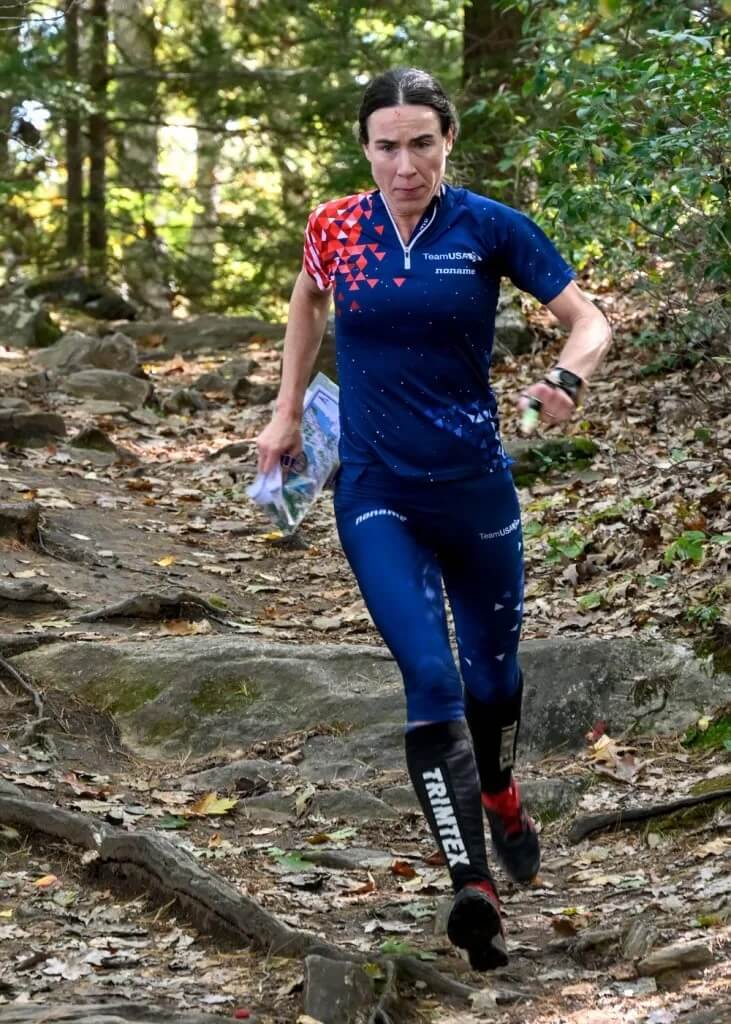
This is a transcript of an interview with Ali in March, 2025. It has been edited for clarity and length.
Cristina Luis: Ali, I would like to hear about your athletic background, from the beginning, and how that melds into orienteering.
Alison Crocker: From the very beginning? Okay.
As early as you want to go. It doesn’t have to be the very beginning.
Okay. I think at my earliest ages I was dragged along to running races with my parents. Totally loved doing all the kids’ races. So I was active from the beginning, and then probably the first serious sport I did was cross-country skiing, up through young juniors. I went to a ski academy for one year–where Alex Jospe currently coaches. I just went there for the winter trying to take skiing really seriously. But then I went to a boarding school where there was more snow than at my house so I could ski but still do academics. And it was there that I discovered two new sports. First, I discovered rowing, which I took seriously for quite a while during all of high school.
And then I also actually discovered orientering during high school with a math teacher who told us what orientering was at morning chapel. I thought it sounded super cool. I signed up and I went a few times to NEOC and UNO meets and totally loved it from the very beginning. But on my third or fourth meet, I was running down some woodsy hillside and my shoulder fell out of its socket. I couldn’t row for the rowing team for a week while it healed and my rowing coach told me I couldn’t do any more of that orienteering thing, whatever it was that got me injured. So that was the end of my early days orienteering. But I knew I liked it from that experience. Through high school I was super competitive in cross-country skiing, super competitive in rowing, and was on the junior world teams for both of those.
I went to Junior Worlds once for rowing in Lithuania and two or three times for cross-country skiing, and then competed in U23s in college. In college my first year I did both skiing and rowing. But it turned out that that was too much, because rowing has a competition season in fall, skiing does in winter and then rowing does again in the spring, and my body was just totally not happy after that. So I quit rowing after the first year.
I just focused on cross-country skiing and didn’t do any orienteering at that time because there was no time and I didn’t know many people who were doing it. I did do a lot with the outing club, which was really fun. I was on the woodsman’s team, and we competed in that which was super fun, we ran up trees with spikes on our feet…
And this is Dartmouth, for context.
Yeah, this is Dartmouth. It’s basically like Colby and Dartmouth and a bunch of agricultural colleges seem to have Woodsman’s teams.
Tell me more about the woodsman’s team. What activities did you compete in?
So you compete in different events–in chopping, in splitting, in fire building, in running up the pole. All those different events. Crosscut sawing. I didn’t do the chainsaw events, but those were part of it.
Was there any axe throwing?
Yeah, there was, but I usually was not our team’s axe thrower.
Yeah all right, but lots of wood manipulating in other ways.
Yep.
Really cool. How does competitive fire building work?
You have a team of two people, and you’re given a single cedar log, three matches, and a pot of water. The first team to boil water wins. I remember there was this one event, it was really windy, and we used up our three matches so I had to run over to get more. But I had been using a knife to split the log and I didn’t put it down. So I was running as fast as I could towards the official, with this knife in my hand, and they were like, “Woah, drop the knife!”
So, definitely relevant to orienteering. And you continued skiing, this is the off-season from skiing?
Yeah, that was off-season.
For skiing, my senior year of college I took the fall quarter off and tried to really seriously train for the Olympics. And I did very seriously train for the Olympics, and then there were Olympic trials and I don’t know… In my best event I did not have good skis. The year before I’d come in second in the US national cross-country like five or 10k classic and then that year for team trials I was eighth or something, and so I was up there but not close enough to make the team. So I’d tried hard to make the Olympic team.
But I did get a Rhodes scholarship that year and I was going to defer it if I did make the Olympics. I didn’t make the Olympics so I went to Oxford, which does not have snow.
It’s not a good skiing destination.
Nope.
And then I really knew I had to finish–in England PhDs are only three years. Most people do Masters before them. I didn’t. So I knew I was going to have to work really hard to finish a PhD in three years. I was just going to forget about sports. My life was taking me in other ways, and that worked well for two months. And then I ran in the intramural cross-country race and came in really high in the results and the cross-country team was, “great, you’re racing for our JV team against Cambridge two weeks from now.” I was like, what? I didn’t know this was part of the deal. And then I was the top Oxford runner in that.
And so I ended up being the backup for the varsity team and then someone did actually break their nose and I ended up running on the varsity cross-country team three weeks later. And so I got very involved very quickly in cross-country running. And then it turned out the orienteering team captain was one of the cross-country runners and he told me I should come and try orienteering. And that’s where I met [former US Team member] Boris [Granovskiy] on a bus to a little rinky dink area near Oxford. When I went orienteering for the fourth or fifth time in my life and kind of rediscovered it and liked it again immediately.
I was not super fast my first time because there was a lot to figure out about the map. And afterwards I just started orienteering a ton with the university team. And did that for the two and a half more years that I was at Oxford.
What year was that you first went to an orienteering event in Oxford?
Early 2007.
You had your adult introduction to orienteering in 2007 and then in 2008 you ran a World Cup race with us, at O-Ringen in Sweden. That’s where we first met.
Yeah.
Just getting a timeline here because that’s fun. That’s pretty quick. Clearly your endurance background helped immensely. And then how about the map reading part, how do you think you developed that? As someone who was fit coming in, were you outrunning your navigation a lot early on?
Yeah. At the beginning a ton. I was like, “what do these squiggles mean?” I just needed to look at them. So I have all these memories of when I would definitely consistently make five minute errors and I’d run fast and get a lot of the time back. But I would be genuinely very confused and lost quite frequently in a race and I’d be happy when the navigation was simple because it meant I could run harder. It was pretty friendly to learn in southern England, to be honest because it’s not super detailed and complicated and so it was a friendly place to start to learn how to navigate. And then I remember the first national level meets in England that I went to and they totally kicked my butt because they were on more complicated maps in the north. And then having to adjust to that and study those.
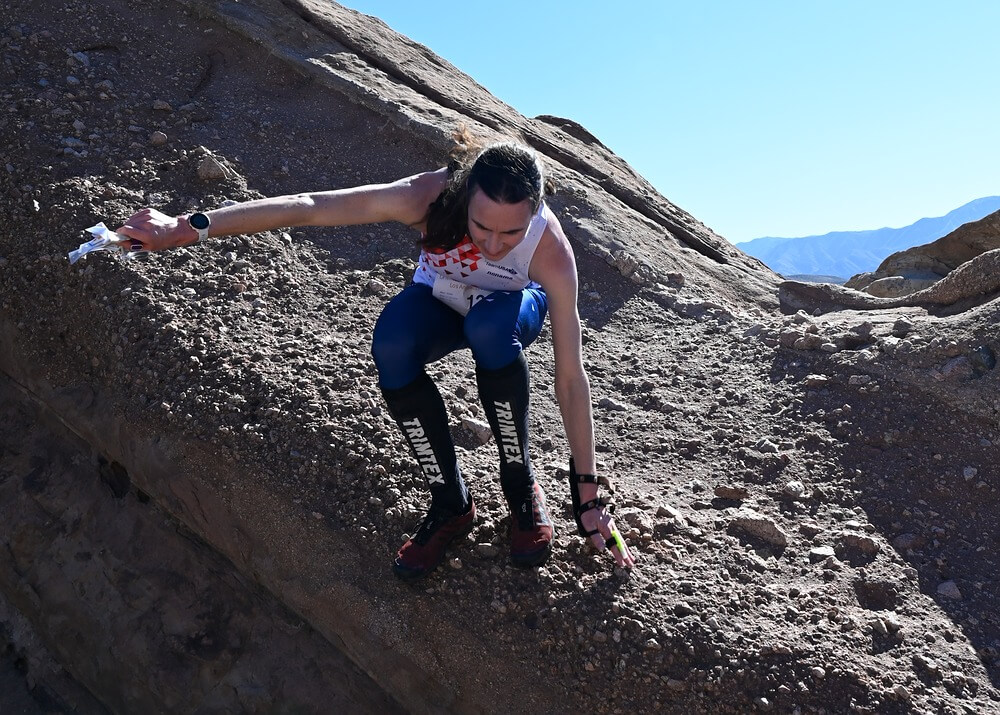
But the Oxford Orienteering Club did great training. We went to the Lake District and other places and I really learned a lot from my teammates. We’d meet up in the pub after the meets and really talk through the race and they’d be like, “Why didn’t you go that way,” or, “could have looked at this?” And was like, “yeah, I could have.” And so I learned a lot from doing those analyses with teammates and from our training camps. One of the varsity races was in Uppsala and that was my first time trying to navigate in that really detailed vague terrain.
In the wilderness.
Yeah.
The O club was really active it sounds like.
Yeah. We went to meets on a lot of weekends, just like the local meets and then we’d go on further trips. But yeah.
And I guess there were other pretty competitive volunteers. Were there any British team types around?
Yeah. There were people on the team at the same time as me who had been on the junior team and who later went on to be on the senior team at least once. So there were people who were good orienteers.
A good crew of people to learn from.
Totally. Yeah.
Yeah, that’s great. Since then, so you’ve been to, I don’t know how many WOCs, do you know off the top of your head?
Alison Crocker: Yeah, not really.
Okay, I looked it up, nine World Orienteering Championships. But you’ve been trying to balance racing with a career in academia, and now a family. How do you choose how much time you can put into things, and prioritize?
Super busy. Yeah, it’s very busy and I think part of the academic career that worked well–less well for ski orienteering–but my summers are more of my own time. I do research with students but I can kind of escape and go to different meets and go to WOC without it being a problem. So that’s one good feature. But during the school year, it’s really hard to find the time to train. It’s even harder now with kids that I can’t just like…if I go running during the day, I can’t just make it up by doing some work at night because there’s all these things I have to do with the kids. So I don’t know. It’s hard.
You earned a personal spot at the North Americans by winning the long and the middle, right? And you’re running all three events at WOC this year. Is this going to be your last world champs?
That’s my plan. I think I’m in good shape this year.
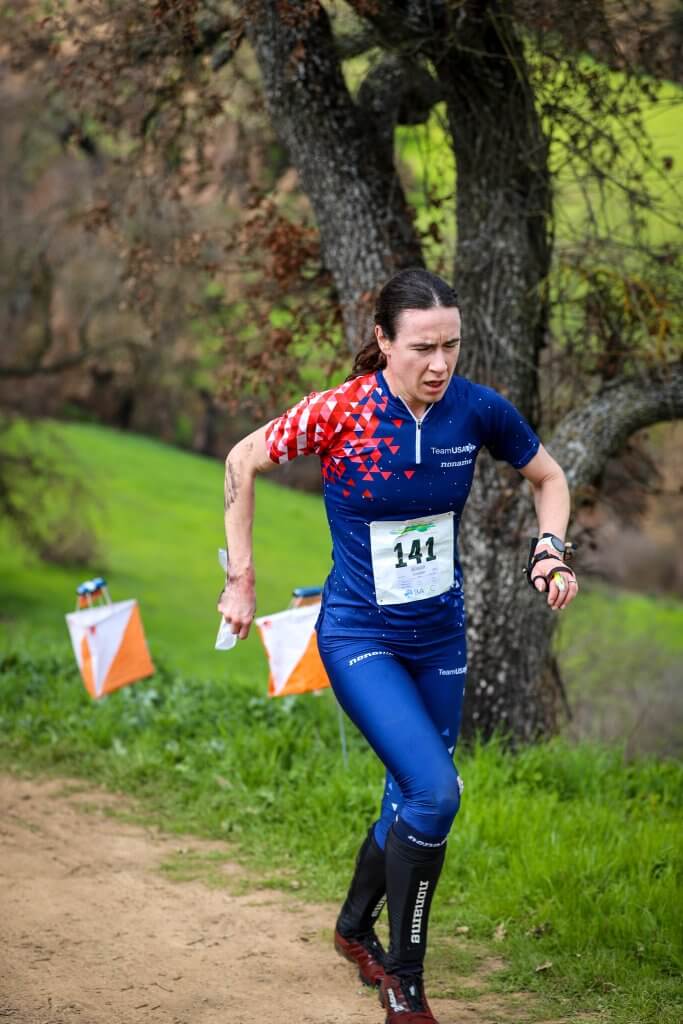
I did a lot of training with a local cross country team throughout the fall and winter. I found that it is fun in cross country to start being a master’s athlete and compete against people my own age. And I think that I’d also have more fun now in orienteering if I start going to master’s world champs and things. So, I think even in the future if I did earn a personal spot, I probably wouldn’t go just because I think for me it’s the time to go do different things.
That makes a lot of sense. Yeah. And I’m glad that you’re not in my masters category.
Looking back at WOC, you have had some very good finishes over the years. Do any stand out to you that you’re particularly proud of?
Totally. Yeah, the one I’m really proud of–I think my best sprint placing was a little higher–but my long in Finland, I think it was 18th. Is that right?
Yes, that’s right.
And I think that’s probably the single race I’m most proud of. I raced really hard, kept the navigation together, and in particular, there was a route choice that I made that was kind of right, at least for me, which was a long runaround leg, and I remember doing it and just being like, I hope this is right. But–and I think the analysis shows that it was a smart choice, at least if you were a fast runner. And so yeah, I’m really proud of that race and it was fun to be there and running fast through the woods and finding things where I wanted mostly.

And you get to go back to Finland this year, though it’s different.
Yes, I think it will be different terrain. But back to Finland this year.
You can channel that good feeling and result.
Is the sprint in Switzerland what you were thinking of, which was a 20th place, is that right? I remember the sprint in Switzerland because it was really technical and it was really tricky and you still were right up there.
And I think that one I was also finishing with [many-time WOC champion] Simone [Niggli] and got hit on the head with Swiss flags.
That’s a memory.
What about Scotland? Did Scotland have a sprint? I feel like that was …
So, yeah, 15th in the sprint in Scotland.
And it was still a sprint but it was mostly parky. And so it helped being able to run fast, keep my head straight, but it wasn’t as dense as an old European city that I find really hard to train for in the US. It’s just such a different type of orienteering.
Of all of your travels for orienteering, including WOCs and whatever else you’ve done, what are the favorite places you’ve been?
Partly Finland because I raced well there and liked it.
You have good memories.
I mean some of my most memorable orienteering is really places I just would never ever have gone. So the ski orienteering in Kazakhstan, that was something I will always always remember.
Because it’s not a place… I even talked to my colleagues in the Russian department here and they’re like, “you were in the middle of nowhere,” and I was like yes we really were. So that was super cool.
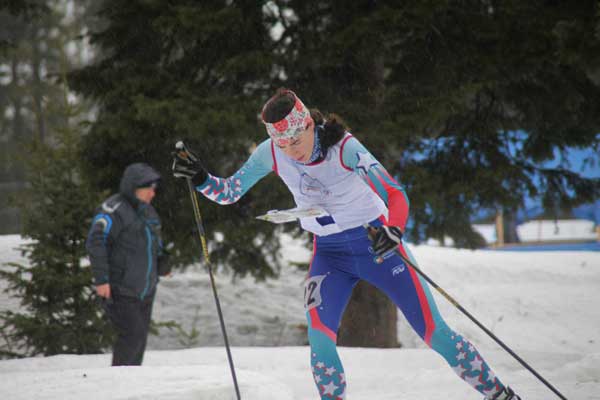
That was a trip. And we didn’t talk about ski WOCs, but your best finishes, placing-wise, are from ski WOC. You have an eighth in the long, right?
Yeah. Yeah.
Yeah, but I guess the depth of competition makes the WOC ones probably feel more…
And they’re more recent so I can remember apparently.
Yeah. 2011, eighth in the relay as well at Ski WOC. [Editor’s note: this was despite the interviewer’s inclusion on the team, not because of it.]
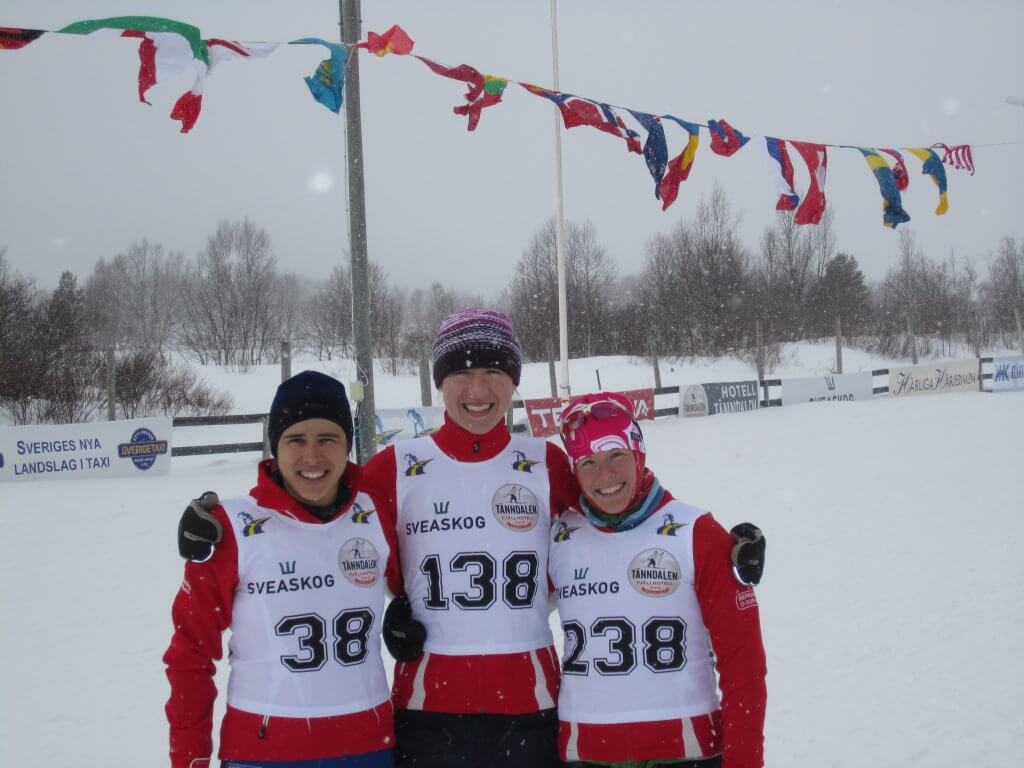
But yeah, I mean I totally love skiing. The only reason I haven’t done it [Ski WOC] recently is I can’t get away from teaching at that time of year. So that’s just a bummer.
Another memory I have, which was just really cool because it intercepted life and orienteering, was still when I was at Oxford. I was still a very very new orienteer. But I had an observing trip to a telescope in Japan. And Boris asked Rob Plowight, who is an Australian living in Japan and coaching their team and mapping there, if I could get some maps of places near the observatory. And I got hooked up with these maps and just took the train from the observatory and went to this forest in Japan and ran around on a map.
And it just felt so powerful to be able to run around in the forest, where I was on this map. I can’t even read a street sign, but I can navigate using a map in this totally foreign country. And so I remember that being just a super cool experience.
Yeah. That is cool because without orienteering you wouldn’t have done anything like that.
Nope.
Probably would have just gone wherever the tourists were recommended to go instead.
Yep.
You’re a physics professor at Reed. Do you find that your physics background and that way of thinking is connected to liking orienteering?
I mean, I think there is and I didn’t believe… actually orienteering taught me that there probably are just different types of brains that kind of like this sort of thing. When I discovered orienteering in Oxford, everyone was doing STEM-y type things, like everyone right. And that’s kind of rung true as I stay in the orienteering world, it’s basically everyone is in really sort of quite logical or science or math types fields, so I definitely think there’s an overlap between the brains that find physics fun and the brains that find orienteering fun. And I have such a brain that’s why I find both things really fun.
What do you think made the biggest difference in improving your orienteering?
I mean it was really a series of steps, from having friendly terrain at the beginning, so it was encouraging and not discouraging to start, and then having training camps that kept pushing my boundaries of orienteering. And then my orienteering really improved in leaps and bounds when I moved back to the US and lived in western Massachusetts and had the gang of five, Peter and Gail Gagarin, Phil Bricker, and me and Alex [Jospe].
The five of us just pushed each other and set up trainings and just got a lot of and just were encouraging and kept orienteering in the forefront of what we were doing. and so that was really helpful. And then also Western Mass is awesome because while there’s a good set of maps just around there in town that you can train on, you can also go to UNO meets, you can go to NEOC meets, you can go to Central New York meets, you can go to HVO meets, you can go to Western Connecticut meets. So you have a menu of awesome meets you can orienteer a ton every single weekend.
Mhm.
And it’s not five hour trips, it’s two hour trips at most. So yeah, orienteered a lot from Western Mass and definitely improved a lot.
So just doing a lot of orienteering and having other people around to help push and talk about things. And for most people that doesn’t happen after moving from Europe to the US…
Mhm. Yeah.
…but for you, I mean England is different than Scandinavia, but for you I guess the Western Mass-ers was the key element part of that probably.
True. Yeah.
The last thing I want to ask you is, what advice do you have for American orienteers who are aspiring to compete internationally? What should these young orienters who are hopefully reading this do? They can’t all go join the US junior cross-country ski team, right? But there’s probably things they can do even so.
Totally. And I think it really breaks down into the two categories of sort of the pure physical, working on running through terrain, if you can. The more cross country, the more mountain trail running probably the better. But really working on the physical running speed side of it. And then working on the technique side, which is dependent on where you are. I think the running side, there’s going to be runners everywhere, right? There’s cross country. You can figure that out. But the technique side can really be hard depending on where in the states you live, and how many maps you have available and how active the club you have around you.
I mean I think my experience with the Gang of Five in western Massachusetts is it doesn’t take much to be a critical mass of people…
Mhm. Right.
…who are interested and can set trainings for each other and make a go of whatever few maps they have around locally. So if a junior can even find a few other local people or even network with people who can at least set the training and then one or two local people who can flag and just make trainings happen for each other, that can really really help.
Yeah. Is Portland a place where people could do that? Do you think there are enough people around Portland?
Yeah. And it goes out of just how much effort people are able to put into it. …
So one more thing. With your busy life, what does your training plan look like between now WOC?
I mean, it mostly looks like trying to do as much good running training and aiming at the more traily off-roady hilly type stuff. Even Finland’s not going to be crazy hilly, so I’m not running up like ski slopes like I was for Switzerland. But still just the off-road nature is more demanding. And then trying to get to as much orienteering as I can. Still TBD if I get to one of the East Coast meets. But I know that that would be good. And then going to the meets that both my club and Cascade are hosting that seem like I can get there and would be helpful. I’ll probably run the men’s categories if there’s longer races…
If there’s a blue, you’ll run it. Yeah, that makes sense. I will most likely be watching WOC from some other country when you compete this summer, but I’m looking forward to seeing what this last WOC looks like for you.
I am too. It’ll be fun.
Thank you, Ali! And good luck at WOC!

